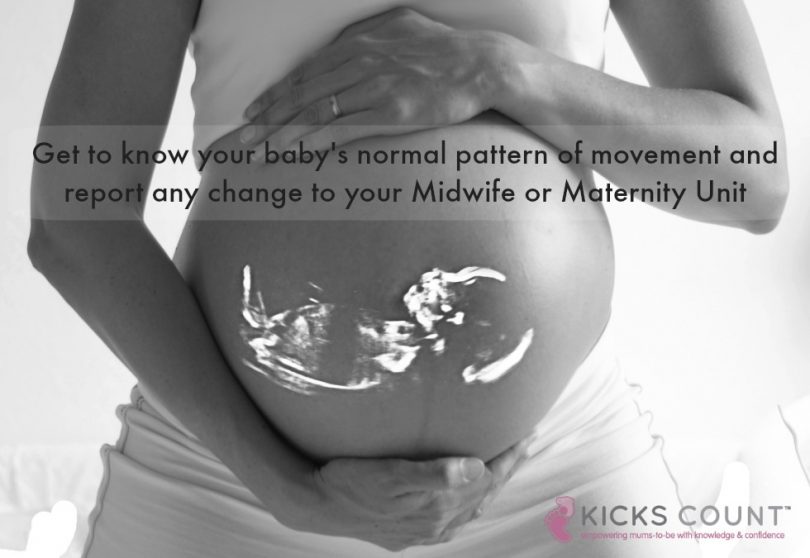

*Disclaimer: I’m not a medical professional, this is info gleaned and synthesised from trusted bodies. Everything I’ve written about can be read on their websites; links have been included in the main body.*
Written in support of Kicks Count to coincide with Bump, Baby & You’s ‘Know Your Bump’ week – starting on the 11th of September 2017.
This week, we will be posting real stories from mamas who have experienced reduced movements first hand, who want to share their stories to help raise awareness of the old wives tales and dangerous misinformation STILL being given out. We are working in support of Kicks Count, an amazing organisation who aim to ’empower mums-t0-be with knowledge and confidence’.
To kick start the awareness week – here are the common misconceptions debunked!
Tackling Misconceptions – Your Baby’s Movements
I’m a huge advocate of awareness raising; I’m not one to sit back and watch dangerous misconceptions continue to be perpetuated! Too many people have been affected by poor, outdated advice, particularly when it pertains to the movements of your precious baby in the womb.
From my experience as an NHS patient, the importance of consistent fetal movement is pretty well known. I was closely monitored, being a high risk pregnancy. When I was put on the ECG, if Max wasn’t moving to the satisfaction of the midwife looking after me, I’d be made to stay until they were happy with his movements. It was fantastic, reassuring, and I will always be grateful to the midwives who looked after us so diligently.
My maternity notes had a ‘Kicks Count‘ sticker placed on them with a direct phone number for me to call if I had any worries. This came in very handy; I first went in with reduced movements at 23 weeks, as I could feel Max from 16 weeks, and he had established a pretty regular pattern by 21 weeks (he’s still a wriggle bum even now). Luckily, all was well, although I was induced with preeclampsia and gestational diabetes at 37 weeks, and his movements definitely started to reduce at around 35 weeks as my body was pumping out so much crap; my blood urates and urine protein levels were ridiculously high. It was a terrifying time but I found that lots of attention was paid to Max’s movements, which was so bloody reassuring!
With this blog, we aim to tackle the most prevalent misconceptions that I’ve seen.
Old misconceptions are often put out there by older relatives and older healthcare professionals, unaware of the latest findings & updated advice. All too often I’ve come across the following statements;
‘Babies run out of room.’
Noooooope. Their movements may transition from sharp jabs to more ‘dull’ rolls and shifting as your baby becomes a chunky monkey, but a baby should maintain the same frequency and pattern of movements even through labour. If a baby wants to move, it will. The type of movement may change but the persistence should not.
‘Babies slow down before labour.’
Absolute tosh. Your baby should still be moving consistently even during labour! It’s an old wives tale that babies ‘slow down to conserve energy’ close to labour.
‘Baby is just being lazy.’
Babies do sleep in the womb, but a ‘lazy’ baby could be a distressed baby. If you are UNSURE if your baby’s movements have reduced, have a sugary drink and lay on your left side. If nothing happens within 30 minutes, you must seek help.
‘Use your doppler, that’ll tell you that your baby is ok.’
HELL NO. I admit it, I had a doppler when I was pregnant. I watched tutorials on how to find Max’s heartbeat, but at no point did I ever use it for reassurance.
A fetal heartbeat is great and all but not only do you run the risk of mistaking your placenta for your baby (the placenta is a complex organ with both fetal and maternal blood flows, therefore a variety of pulses), but also lulling yourself into a false sense of security. Baby could still be distressed! Go by movements, not by fetal heart rate.
Midwives and consultants hate dopplers! Unless you are a trained professional, you don’t know that the heartbeat you’re hearing (if you haven’t picked up your placenta or iliac artery) is even normal.
You won’t know what an ectopic beat sounds like. You won’t know if your baby is brachycardic or tachycardic.
You’ll hear a hearbeat and think ‘oh, thank fuck’. You’ll potentially carry on as normal, blissfully unaware that something is wrong with your baby.
They’re a cute novelty but it deeply worries me when untrained individuals use them for reassurance. I’ve thrown mine away and will never use it again.
Trusted bodies
For this post, I’ve utilised trusted bodies such as the NHS (National Health Service), The Royal College of Obstetricians & Gynaecologists, Tommy’s, and of course Kicks Count, who we are working in support of.
Kicks Count, alongside the NHS, asserts that there is no ‘set’ amount of fetal movements. This guidance is updated from the now outdated advice whereby mums were told to count a specific number of kicks an hour – this is now incorrect as every baby is different.
Kicks Count empahsises the importance of your baby’s movement; every kick does indeed ‘count’!
Please don’t set store by what your mum, gran, auntie, Dorothy next door etc, classes as normal; this advice is based on scientific research. The whole ‘back in my day’ argument is invalid, as when all the old wives tales were doing the rounds, babies were needlessly dying as a result. Know better, do better. That’s how humans have done so well as a species; we learn and adapt.
‘When should I start paying attention to my baby’s movements?’
28 weeks is pretty much universal; some consultants will advise 24-26 weeks for higher risk pregnancies. There are contradicting figures out there but between 24-28 weeks is predominantly what I’ve read.
‘My baby is moving more than usual.’
According to the NHS, your baby’s movements will increase in frequency until around 32 weeks, where they should then plateau. Any change should be checked out.
‘But I have an anterior placenta!’
An anterior placenta can muffle baby; I know this only too well! However, whilst ‘muffled’, it won’t stop you feeling a baby bashing around inside you! Even if you have an anterior placenta, if you have concerns about baby’s movements, please don’t disregard it as ‘oh, baby is muffled by my placenta’.
‘Will a multiple pregnancy cause fewer movements?’
Someone in our private group, who was expecting twins, was actually told that her baby’s movements were reduced as they were struggling for space, what with being a multiple pregnancy. Definitely the first time I’ve heard that one! Baby’s don’t run out of space, whether a single pregnancy or multiple pregnancy.
‘Won’t being a bigger lady mean I feel less movements?’
While it makes sense that it won’t be as easy to feel your baby moving from the outside if you have extra padding (like meeeeeee), we all have the same nerve endings internally and being a bigger lass won’t affect when you feel your baby move inside you. That logic is like saying big girls won’t feel period pains, contractions or gas as easily. Total balderdash!
‘I don’t want to bother the hospital with nothing…’
Lots of women are worried about ‘bothering’ their hospital by going in with concerns about their baby’s movements. Please, don’t be.
To be totally honest, you may come across some stressed midwives; don’t take it personally. The NHS is under immense pressure at the moment, but the well being of your baby supersedes any of this. If you ring and are told not to bother coming in, and are still unhappy, just go. If you’re made to feel bad about going in, complain to PALS; this is something that the NHS invests time and money into publicising (like putting stickers on our maternity notes to raise awareness) so surely it makes sense that their staff should be sticking to protocol.
‘I can’t get through to the hospital!’
If you’re concerned, just go! Put the phone down and go, don’t waste time.
‘I’ll ask on Facebook first…’
Man… this is my biggest bugbear. Of course, we are all here to help and give advice if you ask in a parenting group on Facebook , but when it comes to your precious baby, is it really worth the time you’ll spend typing out a post, waiting for responses, replying to them and then sorting yourself out to get to the hospital? No. Please, don’t consult Facebook with serious medical concerns. I’m saying this from a place of love and concern so please don’t take it the wrong way.
‘But my baby moves more at night when I’m asleep!’
Later on in my pregnancy, as my health concerns became serious, I actually set alarms intermittently throughout the night so that I could check baby; this actually meant I could go and wee too, so it wasn’t a chore. I found that I was able to get a more accurate idea of Max’s movements, and got the reassurance that I needed. If you’re concerned that your baby is a night owl, give this a go.
‘My baby doesn’t have a pattern!’
Regardless, you’ll still have some idea of the frequency of your baby’s movements, and your instinct will tell you if something may not be right. If you think your baby has moved less than usual, it’s not worth disregarding. Go and get seen!
The reflection of baby’s health on your own state of health.
Your baby’s health and your own are very intricately interwoven; your health can impact your baby, and vice versa.
In some instances, such as a silent placental abruption, a change in your baby’s movements can signify a sinister turn in your health. We all think of pain, blood and panic when a placental abruption is mentioned. With a silent abruption, the blood is sealed between the placenta and the uterine wall, and is painless, hence the term ‘silent abruption.’ This will cause baby to move less; being aware of your baby’s movements could literally save your life, as it will bring your disguised blood loss to the concern of the doctors.
In addition, conditions such as hypertension, preeclampsia, and gestational diabetes can all impact baby’s health. If your blood pressure is high, you should be checked; every time I had a high reading, my urine would also be screened and I’d have bloods taken. Raised blood pressure can increase the risks of a blood clot, and risks reducing the flow of blood to the placenta, amongst other things. Gestational diabetes can cause macrosomia (larger than average baby) and impact your baby’s blood sugar levels. This increases the risks of birth trauma and stillbirth.
With these things in mind, if you’re diagnosed with any of these conditions, you should pay extra close attention to your baby, as your pregnancy will be higher risk.
Ultimately…
You and only you know your baby. You know your own gut instinct. You know what is normal for your baby. If you have any concerns, please get your bum down to your maternity triage department without delay. Don’t rely on dopplers, Facebook, or your auntie’s second cousin’s nieces best friend’s grandma’s judgement that it’s ‘normal’ and that you’re just being hysterical. Don’t be afraid of looking daft; it’s better to be safe than sorry.
Go. To. The. Hospital.




.png)








.png)